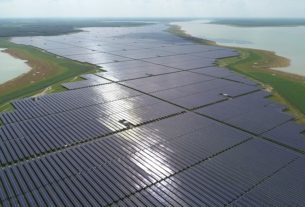
An artist’s conception of the Singha Complex, a mixed-use development project that will be located on an 11-rai site at the corner of Asok and Phetchaburi roads.
Related search
Bangkok is among the cheapest places to have an office even though other Asian cities account for four of the top five most expensive locations, according to CBRE Research’s half-yearly Global Prime Office Occupancy Costs survey.
London’s West End remains the world’s highest-priced office market.
Bangkok was ranked 105th out of 127 cities surveyed by CBRE Research in the first quarter for overall occupancy costs for Grade A office space. Australian capital Canberra was the only city in the Asia-Pacific region cheaper than Bangkok at 111th position.
London’s West End was the most expensive at 8,058 baht per square metre per month. Next were Hong Kong (Central) at 7,669 baht, Beijing (Finance Street) at 5,907 baht, Beijing’s central business district (CBD) at 5,657 baht and New Delhi (Connaught Place) at 4,735 baht.
The year-on-year rise in prime office occupancy costs mirrored the gradual recovery of the global economy. They increased globally by 2%, with Asia-Pacific up 1.4%.
“Occupier caution has declined and corporate confidence has been on the rise, and this confidence is starting to translate into a degree of expansionary momentum,” said Richard Barkham, CBRE’s global chief economist.
“At the same time, many office markets are increasingly short of the quality, modern, flexible and highly accessible or CBD-located office buildings that corporations are seeking to execute workplace strategies that will drive productivity and attract or retain talent.”
Henry Chin, head of research at CBRE Asia Pacific, said regional occupancy cost trends were mixed, with surveys showing stronger hiring intentions in India, Taiwan, New Zealand, the Philippines and Japan but muted activity elsewhere.
India and the Philippines also continued to benefit from growing IT back-office services looking for operational and costs efficiency. Throughout Asia, technology companies, business process outsourcing firms and non-banking financial institutions are in expansionary mode, stimulating demand for office space.
“However, we are also seeing diverse occupier activity in the region with fewer expansionary markets — some occupiers are looking to optimise existing accommodation rather than expand,” said Mr Chin.
In the first quarter, average Grade A rents in Bangkok’s CBD increased by 3.2% to 859 baht per sq m per month.
Limited supply is due for completion between 2015 and 2017, with less than 400,000 sq m of office space under construction.
About 20% of space under construction will be Grade A in the CBD. The total net take-up in Bangkok for the first quarter was about 65,000 sq m, up 17%.
“The space taken up at owner-occupied buildings was a significant part of net take-up. A reasonable level of demand and limited supply have caused office rents to rise by 3-12% year-on-year in all grades and areas,” said James Pitchon, executive director and head of research at CBRE Thailand.
CBRE tracks occupancy costs for Grade A or prime office space in 127 markets around the world.
Source: http://www.bangkokpost.com/property/news/601972/city-offices-among-cheapest


